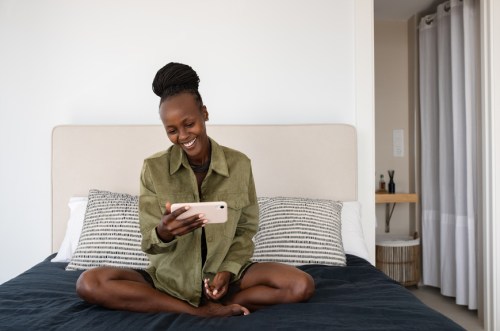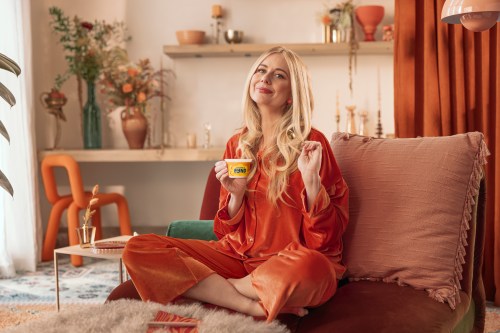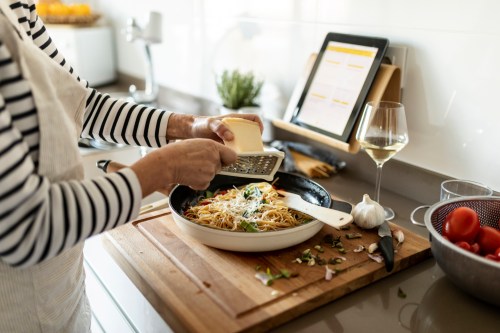Nutrition Advice Is All Over Social Media—These 5 RD-Approved Red Flags Can Help You Suss Out Which Tips Are Totally Bogus
Two dietitians share red flags they look out for when bombarded with too much health-related content on social media.

Although social media can be a great place for seeking inspiration for a weeknight meal, it also can be a medium that spreads harmful and potentially life-threatening misinformation, like the recent viral “sleepy chicken” TikTok trend.
Experts in This Article
an anti-diet dietitian based in Raleigh, North Carolina
anti-diet dietitian based in Philadelphia, Pennsylvania
Some information might also instantly set off your internal “that’s sketchy” alarm—especially when it comes to diet culture. Ever find yourself stepping away from a scroll session feeling seriously confused, or worse, ashamed, after encountering questionable health or nutrition advice? Ever promised yourself you’d start mirroring the (ahem, bogus) What I Eat in a Day meal regime your favorite fitness influencer posts religiously? Sadly, while the detrimental impacts of toxic diet culture are nearly impossible to avoid, folks that use social media are far more likely to be exposed to unwarranted, uneducated, and often shame-inducing advice about “healthy” eating.
In truth, nutrition advice on platforms like Instagram and TikTok can seem entirely harmless upon first impression; you might not even pick up on any potential warning signs that the “tips” being fed to you are neither backed by science nor coming from someone who is certified (or experienced enough) to provide health information. This is why it can be a great idea to take a step back every so often and analyze the intent behind said posts—as well as consult with some trained nutrition professionals, like dietitians, on best practices for assessing the legitimacy and accuracy of information.
We spoke with two registered dietitians that focus on leading a well-balanced and healthy lifestyle to learn more about the red flags they look out for when bombarded with too much health-related content on social media.
5 red flags a dietitian looks out for on social media
1. Health-related posts without credible sources are an immediate “no”
A major red flag for Christine Byrne, MPH, RD, LDN, an anti-diet dietitian who specializes in eating disorders, is social media posts that don’t have clear credible sources to fact-check the information being shared. And even when reputable sources like the CDC or credible peer-reviewed journals are used, Byrne adds that they shouldn’t be your sole way of attaining nutrition-related information.
“I think social media is a great place to be introduced to new ideas, but it shouldn’t be the sole place you get health or nutrition facts because social media makes things way too abbreviated,” Byrne says. “You only have so many characters; you can’t really dig into what’s behind a lot of these ideas.” There’s simply no denying that cramming all of the comprehensive information behind a study is nearly impossible to accurately do within a 60-second time constraint.
Instead, Byrne encourages seeking out additional sources of information to cross-reference. “You need to find what’s called a systematic review or a meta-analysis, which is a study that takes data from lots and lots and lots of other studies on that same topic and looks at that huge data set together,” she says.
2. If it sounds (or looks) too good to be true, it’s probably the algorithm… rather than the facts
Social media algorithms—which are ways of sorting posts in a user’s feed based on relevancy instead of publishing time—can heavily influence the type of information and content a user sees. “This is an alarming reality when it comes to spreading health information on platforms like TikTok,” says Dalina Soto, MA, RD, LDN, a registered dietitian and founder of Your Latina Nutritionist. “Videos can arbitrarily gain a ton of traction not because of their validity, but rather because of the way they’re presented.”
Soto notes that she has noticed consistent themes when it comes to questionable content. “When something contains misinformation, it tends to be a lot flashier and a lot more attention-grabbing. Something as basic as super catchy music is meant to keep you interested, but it can also make a host sound more authoritative than they are,” she says. Same goes for clickbait-style language, flashy headlines, or overly-promising health claims. “These can all lead to fearmongering or elicit unnecessary fear,” Soto adds.
While this is obviously not always the case, it is important to keep in mind that these apps and social media platforms are motivated to get you to spend as much time on them as possible—and spreading factual, science-backed information is, well, lower on their list of priorities.
3. Health-related recommendations that are way too generalized and all-encompassing
With over 4.26 billion people on social media worldwide as of 2021, it’s virtually impossible to share health-related recommendations that best suit every single individual. Although Byrne acknowledges that the average person might not need a hyper-individualized meal plan, those that do should avoid relying on any form of all-encompassing information in particular. “I think it’s so crucial to get personalized advice from an expert; all of this overly-generalized advice out there just isn’t going to be work for everyone,” she says.
Byrne also says to be weary of trusting one-off recommendations that are hyperspecific. “One thing I see a lot on social media is people saying, ‘this worked for me.’ While potentially compelling or relatable, it should still be taken with a grain of salt. One person is not evidence. That’s just an anecdote,” she says.
4. Content that promotes instant gratification or immediate results
According to Soto, another red flag is content that hypes the idea of instant results after committing to a practice for a brief period of time. (A “try this fad for 10 days and see these results” callout is mighty sus, she says.) It’s simply too hard to know if something is really working—or not—in such a short time span. “You might feel great, right? But maybe you did other healthy behaviors while you were doing this 10-day fix. Or, what’s more likely happening is that it’s the placebo effect,” Soto says.
5. When medical professionals on social media impose too many of their own beliefs or make “absolutions”
Two of the most important pillars that Soto stands by as a medical professional are body autonomy and respecting an individual’s own belief system. “How I think of health is that it’s individual. Meaning my job as a dietitian and a healthcare provider is not to tell you what to do. It’s to educate you and let you have your own body autonomy. If someone is telling you that you have to do something, that should be a red flag. You should be able to do what works for you and your body,” Soto emphasizes. Aside from doing what’s best for you, she says you should always lead with self-compassion—especially if you do decide to try something new.
What a registered dietitian does when bombarded with bogus info on social media
One of the most important ways that Byrne handles too much information on social media is by asking the right questions and staying inquisitive. “Be skeptical of what you see on social media, and try to avoid believing in things that seem totally out there because those things probably aren’t true,” she says.
However, if it becomes too much, taking a break from social media entirely might be the best plan of attack. “Being disconnected from the highlight reels of other people’s lives can be really helpful in helping us feel better about ourselves and about our own lives,” Erin A. Vogel, PhD, a social psychologist, previously told Well+Good.










